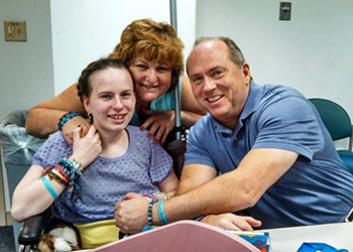A Massachusetts judge on Tuesday granted the state “permanent custody” of an ill teenager who has spent the last year caught up in a dispute between her family on one side and Boston Children’s Hospital and the state Department of Children and Families on the other. While many facts are in dispute, one thing is clear: Justina Pelletier spent the past year in a locked psych ward, even though doctors disagree about whether her condition is psychiatric.
It’s easy to follow Justina’s case on Twitter and get caught up in the outrage. What’s surprising is to read up on it and have your outrage legitimized.
According to Patricia Wen’s excellent reporting in the Boston Globe, Justina had been a patient of Mark Korson, a metabolic disorders specialist at Tufts, for several years. He had diagnosed her with a mitochondrial disease that caused her to have trouble eating and walking. During a particularly scary spell in February 2013, he told her parents to take her to Boston Children’s to see a former Tufts colleague of his, a gastroenterologist.
The Pelletiers did just that. But they never saw the gastroenterologist, and Justina has not been home since. The doctors at Children’s diagnosed her with somatic symptom disorder, a psychiatric condition akin to hypochondria. When her father tried to have her discharged to take her back to Tufts, the Boston Globe reports, “he watched a swarm of hospital security approach to guard each exit.” The hospital “filed an allegation of medical child abuse” against the couple for seeking what the hospital deemed as “unnecessary treatment” and petitioned the state for custody.
What has ensued since is a harrowing medical and legal drama. Wen’s two-part series, co-written with Neil Swidey, that ran in December paints a picture that will likely terrify any parent who reads it, whether your children are healthy or need special care.*
Why can’t doctors figure out if Justina is suffering from mitochondrial disease or a psychiatric disorder? Her doctor at Tufts (let’s call this side “team mito”) points out that there is no test to confirm somatic symptom disorder, while doctors at Children’s (“team psych”) were troubled by the many medical interventions that Justina had been subjected to as a result of her disputed mitochondrial diagnosis. One doctor quoted by the Globe points out that the mere diagnosis raises suspicions: “It’s the kind of diagnosis vulnerable to manipulation by parents,” Dr. Alice Newton said.
When parents disagree with doctors, a hospital such as Children’s has a huge advantage. Because the state’s Department of Children and Families lacks medical expertise, Swidey and Wen point out, it often turns to Children’s for assistance. So when Children’s files a medical abuse claim against parents, DCF turns to … Children’s? This isn’t a rare or theoretical conflict of interest. Children’s has had five similar custody cases in the past two years. Critics call it a parent-ectomy.
Apparently the Pelletiers can be difficult people—they have yelled at the doctors and threatened DCF social workers, and they refused offers for Justina to be put in a long-term care facility closer to their home. (Justina was recently moved to a residential psychiatric facility in Framingham, Mass.) And they are not giving up: There are reports that they are filing a writ of habeas corpus for wrongful imprisonment. But if I were a parent who felt a hospital was interfering with my rights and harming my child, I can’t say that I would act any differently.
Correction, March 27, 2014: This post originally misspelled Boston Globe reporter Neil Swidey’s last name.
